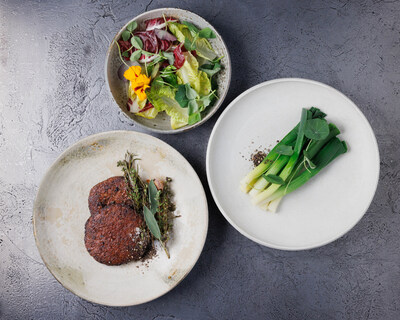Pioneering consortium transforming CO2 into nutritious food is entering into a new phase, where promising solutions will be scaled and food prototypes will be produced and tested. The Acetate Consortium initiative is funded by Gates Foundation and the Novo Nordisk Foundation.
COPENHAGEN, Denmark, Sept. 22, 2025 /PRNewswire/ — Imagine if we were able to turn one of our biggest environmental challenges – CO₂ – into nutritious food. The idea is not as far out as it may sound.
Since 2023, a consortium consisting of research institutions and private companies has been working with a radically new approach to food production that makes it possible to replace sugar in fermentation processes with CO₂-derived acetate.
The goal is to mitigate food insecurity and climate change as well as eliminating land use for food production. The principle behind is based on natural processes that can be scaled into financially viable production of nutritious food without using agricultural land.
The consortium has now been renewed for another two years with funding up to DKK 162.2 million (€21.7 million) split evenly between Gates Foundation and the Novo Nordisk Foundation.
“We need tangible solutions that can feed more people without putting pressure on our natural resources and enabling food production in areas that have very little or no agricultural land. When the consortium began its work two years ago, making food derived from CO2 seemed like something taken from a science fiction movie. Within the next two years, we can expect to see actual prototypes of food products that will be tested by consumers. The collaboration in the consortium is a good example of what we can achieve with biosolutions when researchers and companies combine their strengths and work towards a clear common goal,” says Claus Felby, Vice President for Agri-Food at the Novo Nordisk Foundation.
Introducing food prototypes and consumer testing
In the second phase of the work, the consortium will focus on optimizing and scaling the technologies and methods as well as developing and testing food prototypes.
This new scope introduces a broader consortium with new partners that bring expertise in food science, consumer behavior, gastronomy, and socio-economic modeling. This expertise will complement the continued development and scaling of the technological platform developed in the first phase of the consortium. During the next phase, the technical, economic, and environmental impact of the technological solution developed by the consortium will also be modeled.
Denmark has a strong tradition of collaboration between researchers and industry within food production and biosolutions. This provides a solid foundation for translating new technologies into tangible products.
At the same time, the Danish gastronomic scene contributes a unique culture of experimenting with food. This is a capability the consortium will benefit from through the inclusion of Spora, whose founder, Rasmus Munk, is also head chef at the 2-star Michelin restaurant Alchemist in Copenhagen.
The new composition of the consortium creates a strong framework for connecting science, technology, and consumer experiences.
“One of Denmark’s strengths is the ability to bridge research, industry, and gastronomy. This makes us an ideal test country for new technologies such as this, where CO₂ can be used as a raw material for future food. Here we can develop and test prototypes in close collaboration with researchers, companies, and chefs, and share our findings to benefit communities and industries worldwide,” says Claus Felby, Vice President, Agri-Food, Novo Nordisk Foundation.
Technology platform and key results from phase 1
The Acetate Consortium has developed an integrated platform that converts CO₂ into acetate, which is then used to ferment single-cell and precision proteins. This makes it possible to directly feed fermenting microorganisms with acetate – the basic component of their metabolism – and avoid adding sugar to the process. This approach eliminates the need for sugar in fermentation, significantly reducing the use of land and water.
Phase 1 results include:
- Development of microbial strains that grow on 100% acetate and contain >40% protein.
- Completion of pilot facilities at Aarhus University in Denmark for individual acetate production modules.
- Identification of key cost drivers: electricity and infrastructure.
Consortium partners and funding
Moving forward, the consortium will consist of the following partners:
- Topsoe
- Novonesis
- Orkla Foods
- Spora
- The Novo Nordisk Foundation CO2 Research Center (CORC)
- Department of Biological and Chemical Engineering, Aarhus University
- Department of Food Science, University of Copenhagen
- Department of Food and Resource Economy, University of Copenhagen
- Northwestern University
- Copenhagen Process
The total funding budget is up to DKK 162.2 million (€21.7 million) and covers a two-year period (2025-2027).
The funding of the consortium is split evenly between Gates Foundation and the Novo Nordisk Foundation.
Gates Foundation is funding activities at Novonesis A/S, Copenhagen Process ApS and Northwestern University, while the Novo Nordisk Foundation is funding the remaining partners.
About the Novo Nordisk Foundation
Established in Denmark in 1924, the Novo Nordisk Foundation is an enterprise foundation with philanthropic objectives. The vision of the Foundation is to improve people’s health and the sustainability of society and the planet. The Foundation’s mission is to progress research and innovation in the prevention and treatment of cardiometabolic and infectious diseases as well as to advance knowledge and solutions to support a green transformation of society.
Media enquiries
Sabina Askholm Larsen, Senior Communications Partner, sla@novo.dk
Photo – https://mma.prnewswire.com/media/2777491/Novo_Nordisk_Foundation.jpg
![]() View original content to download multimedia:https://www.prnewswire.com/news-releases/climate-resilient-food-innovation-international-consortium-aims-to-produce-food-prototypes-derived-from-co2-302562370.html
View original content to download multimedia:https://www.prnewswire.com/news-releases/climate-resilient-food-innovation-international-consortium-aims-to-produce-food-prototypes-derived-from-co2-302562370.html
SOURCE Novo Nordisk Foundation



